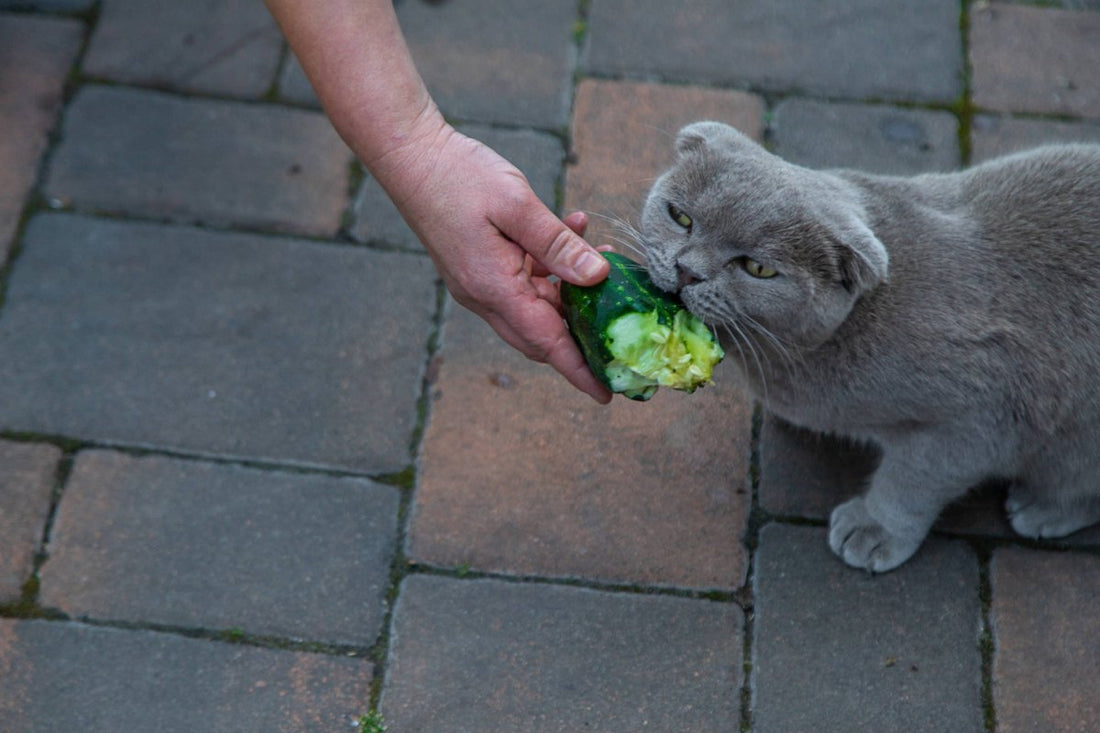Cucumber for cats: healthy refreshment or unnecessary gimmick?
When it comes to our furry friends' diets, the question often arises: Can cats eat vegetables? Cucumbers are not only a light snack for us humans, but also popular with many animals. But what about cats? Can cats eat cucumbers? The answer is yes, but only under certain conditions. In this blog, you'll learn everything you need to know about cucumbers for cats—from the health benefits and potential risks to proper preparation.
Can cats eat cucumber? The short answer
Yes, cats can eat cucumbers as long as they are fed in small amounts and prepared properly. Cucumbers are low in calories, rich in water, and contain no harmful substances. However, they should only be offered occasionally and in small portions.
What is allowed?
- Fresh, peeled cucumber in small pieces.
What is forbidden?
- Bitter cucumbers or cucumber peel, which may contain pesticides.
The benefits of cucumber for cats
Cucumber is not only low in calories but also rich in valuable nutrients that can benefit your cat. Here are its key benefits:
1. High water content
- Cucumbers are 96% water, making them ideal for supporting your cat's hydration, especially on hot days.
2. Low in calories
- For cats who need to watch their weight, cucumber is a perfect snack because it contains hardly any calories.
3. Vitamins and minerals
- Vitamin K: Supports blood clotting and bone health.
- Vitamin C: Strengthens the immune system and has an antioxidant effect.
- Potassium: Promotes muscle function and fluid balance.
4. Fiber
- Support digestion and promote healthy intestinal flora.
5. Teeth cleaning
- Chewing on cucumber pieces can help clean your cat's teeth and prevent tartar buildup.
How much cucumber can cats eat?
The right amount is crucial to ensure that cucumber is beneficial to your cat and not stressful. Too much cucumber can cause digestive problems.
Recommended amount:
- Small cats: One thin slice of cucumber (approx. 1–2 cm) per week.
- Medium-sized cats: 2–3 slices per week.
- Large cats: Up to 5 small slices per week.
Risks and precautions with cucumber
Although cucumber is healthy, there are some risks you should be aware of:
1. Bitter substances
- Some cucumbers may contain bitter substances that can be unpleasant or harmful to cats.
2. Pesticides
- Cucumber skin may contain pesticides, so it should always be peeled before eating.
3. Overfeeding
- Too much cucumber can cause diarrhea or vomiting, as cats cannot tolerate large amounts of raw vegetables.
4. Allergies
- Although rare, some cats can be allergic to cucumber. Watch for symptoms such as itching, vomiting, or diarrhea.
How do you properly feed your cat cucumber?
Proper preparation is crucial to ensure cucumber is safe and digestible for your cat. Here are some tips:
1. Wash and peel the cucumber
- Remove the peel to avoid pesticide residue.
2. Cut into small pieces
- Cut the cucumber into bite-sized pieces or thin slices so your cat can eat it easily.
3. Serve fresh
- Make sure the cucumber is fresh. Old or mushy cucumbers should not be fed.
4. Offer in small quantities
- Start with a small portion to ensure your cat tolerates the cucumber well.
5. No spices or additives
- Always serve the cucumber plain, without salt, vinegar or other additives.
Creative ways to prepare cucumber for cats
Cucumber doesn't have to be served boringly. Here are some ideas to make it tasty for your cat:
1. Cucumber slices as a snack
- Cut the cucumber into small slices and serve it plain.
2. Cucumber cubes in wet food
- Mix small cubes of cucumber into the wet food to spice it up.
3. Cucumber water
- Soak some cucumber slices in water and serve it to your cat as a refreshing drink.
4. Cucumber ice cubes
- Freeze small pieces of cucumber in water – ideal for hot summer days.
When should you not give your cat cucumber?
In some cases, cucumber is unsuitable for cats:
1. Digestive problems
- Cats with sensitive stomachs may react to cucumber with diarrhea or flatulence.
2. Allergies
- If your cat is allergic to cucumber, you should stop giving it to him.
3. Bitter cucumbers
- Avoid cucumbers with a bitter taste, as they are unpleasant for cats.
Frequently asked questions about cucumbers for cats
“Can cats eat cucumbers?”
Yes, but only in small quantities and well prepared.
“Is cucumber poisonous to cats?”
No, cucumber is not poisonous as long as it is fresh and peel-free.
“Can cats get diarrhea from cucumbers?”
Yes, if you eat too much cucumber it can cause digestive problems.
“What alternatives are there to cucumber?”
Zucchini or carrots (steamed) are also suitable vegetables for cats.
Conclusion: Cucumber for cats – Refreshing, but not for every day
Cucumber can be a healthy and refreshing addition to your cat's diet when fed in small amounts and prepared correctly. Key points at a glance:
- Safe: Fresh, peeled cucumber in small pieces.
- Advantages: High water content, low in calories and rich in nutrients.
- Caution: Avoid bitter substances, pesticides and overfeeding.
With these tips, you can safely offer cucumber to your cat without worry. Not only is it healthy, but it's also a summery change that your furry friend will enjoy!



